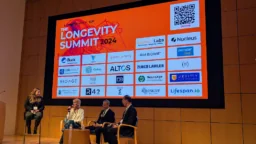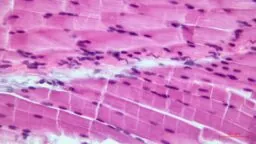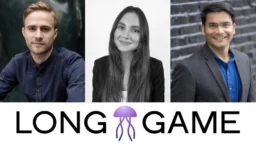Rejuvenation Roundup December 2024
- Mitochondria and senescent cell issues were just the tip of the iceberg.

The holiday season is over and the new year is here, and we’re back to discussing the one gift that matters the most: biological rejuvenation. Let’s see what’s been done in December.
LEAF News
 Another Year of Longevity Advocacy and Journalism: The nights are the longest of the year, the holidays are drawing near, and we are back with a festive edition of the Lifespan.io editorial. This time, we bring you some of this year’s highlights and talk about what the future holds for our content.
Another Year of Longevity Advocacy and Journalism: The nights are the longest of the year, the holidays are drawing near, and we are back with a festive edition of the Lifespan.io editorial. This time, we bring you some of this year’s highlights and talk about what the future holds for our content.
Interviews
Mehmood Khan on Aging Policy and Collaboration: Khan is not just a high-profile bureaucrat. He has a solid background in science and healthcare, having served as Chief of the Endocrine Division at Hennepin County Medical Center in Minnesota and later as a faculty member in endocrinology at the Mayo Clinic and Medical School.
 Why Research Teams Should Email XPRIZE Healthspan Now: With the deadline for submissions just around the corner, Jamie Justice, Executive Director of XPRIZE HealthSpan, explains to researchers still on the fence why they should contact her team now but also why missing the deadline is not the end of the world.
Why Research Teams Should Email XPRIZE Healthspan Now: With the deadline for submissions just around the corner, Jamie Justice, Executive Director of XPRIZE HealthSpan, explains to researchers still on the fence why they should contact her team now but also why missing the deadline is not the end of the world.
Advocacy and Analysis
Can AI Predict Your Death?: Once confined to the realms of science fiction or relatively crude internet death calculators, AI-driven predictions about longevity are inching closer to reality. Questions about the accuracy and value of these forecasts remain.
 The Best Talks From Longevity Summit 2024: Earlier this month, for the third year in a row, the famed Buck Institute for Research on Aging hosted the Longevity Summit. This two-day event was organized by Longevity Global, a community of longevity researchers, investors, and enthusiasts, and its founder Dr. Christin Glorioso.
The Best Talks From Longevity Summit 2024: Earlier this month, for the third year in a row, the famed Buck Institute for Research on Aging hosted the Longevity Summit. This two-day event was organized by Longevity Global, a community of longevity researchers, investors, and enthusiasts, and its founder Dr. Christin Glorioso.
Research Roundup
A Clinical Trial of a Three-Part Treatment for Inflammaging: Reseachers publishing in Antioxidants have combined three antioxidant and anti-inflammatory compounds and tested their effects in human beings. The researchers hold that this supplement combination has significant effects on oxi-inflammaging, a combination of oxidative stress and inflammaging that has been suggested to have significant effects on lifespan.
 Resveratrol, Vitamin C Drop Oxidative Stress After Menopause: In a randomized, controlled trial published in Nutrients, researchers tested supplementation with resveratrol, vitamin C, and a combination of both. They learned that all of the treatments had a similar positive impact on oxidative stress in postmenopausal women.
Resveratrol, Vitamin C Drop Oxidative Stress After Menopause: In a randomized, controlled trial published in Nutrients, researchers tested supplementation with resveratrol, vitamin C, and a combination of both. They learned that all of the treatments had a similar positive impact on oxidative stress in postmenopausal women.
AI Outperforms AI-Assisted Doctors in Diagnostic Reasoning: In a new study, ChatGPT 4.0 achieved significantly better diagnostic scores when evaluating complex cases than either unassisted human physicians or physicians who consulted the chatbot.
 Fragmented Mitochondria Linked to Muscle Weakness: In a study published in Aging Cell, researchers have outlined a relationship between mitochondrial fragmentation in skeletal muscle and the loss of strength with age. As exercise is associated with mitochondrial fusion and one study had suggested that six months of endurance training can compensate for 30 years of aging, the authors suggest that further research on exercise in older people should be done with a close examination into mitochondrial changes.
Fragmented Mitochondria Linked to Muscle Weakness: In a study published in Aging Cell, researchers have outlined a relationship between mitochondrial fragmentation in skeletal muscle and the loss of strength with age. As exercise is associated with mitochondrial fusion and one study had suggested that six months of endurance training can compensate for 30 years of aging, the authors suggest that further research on exercise in older people should be done with a close examination into mitochondrial changes.
Nuclear Expression of a Mitochondrial Gene in Mice: Scientists from the Longevity Research Institute (LRI), which was formed by the merger of SENS Research Foundation and Lifespan.io, have achieved expression of an essential mitochondrial gene in the nucleus and proper functioning of the protein. This could pave the way for curing diseases caused by mitochondrial mutations.
 Senescent Cells Protect the Bladder: In Aging Cell, a research team has explained why barrier cells in the human bladder are largely senescent and what might lead them to become cancerous. The researchers note that these senescent cells are clearly necessary for proper function of the bladder, suggesting that they should be treated rather than destroyed, such as by improving their mitochondrial function or reducing their oxidative stress.
Senescent Cells Protect the Bladder: In Aging Cell, a research team has explained why barrier cells in the human bladder are largely senescent and what might lead them to become cancerous. The researchers note that these senescent cells are clearly necessary for proper function of the bladder, suggesting that they should be treated rather than destroyed, such as by improving their mitochondrial function or reducing their oxidative stress.
Extending Monkeys’ Reproductive Span With Stem Cells: An investigation into transplanting human embryonic stem cells (hESC)-derived MSC-like cells (M cells) into the ovaries of cynomolgus monkeys suggests an extension of female reproductive span accompanied by a reduction in senescence-associated processes, such as inflammation, fibrosis, oxidative damage, and apoptosis.
 Encouraging Hair Growth by Reducing Senescence: In Aging Cell, researchers have described how to improve the hair growth potential of stem cells and organoids by reducing cellular senescence. The researchers hold that senolytics are key in overcoming one of the major hurdles associated with this line of work.
Encouraging Hair Growth by Reducing Senescence: In Aging Cell, researchers have described how to improve the hair growth potential of stem cells and organoids by reducing cellular senescence. The researchers hold that senolytics are key in overcoming one of the major hurdles associated with this line of work.
A Senolytic Approach to Faster Wound Healing: Researchers have published in Aging their findings that a senolytic compound accelerates wound healing in aged mice when it is administered before the wound occurs.
 Lower Rates of Epigenetic Aging in Olympic Champions: A recent investigation into Hungarian Olympic champions suggests slower epigenetic aging and differences in gene methylation patterns between champions and non-champions.
Lower Rates of Epigenetic Aging in Olympic Champions: A recent investigation into Hungarian Olympic champions suggests slower epigenetic aging and differences in gene methylation patterns between champions and non-champions.
How Cellular Reprogramming Affects Mitochondrial Dysfunction: Creating induced pluripotent stem cells (iPSCs) causes mutant mitochondrial populations to change, and researchers have investigated this phenomenon more thoroughly.
Associations of accelerometer-measured physical activity, sedentary behaviour, and sleep with next-day cognitive performance in older adults: Memory benefits of physical activity may persist for 24 hours; longer sleep duration, particularly more time spent in slow-wave sleep, could independently contribute to these benefits.
Dietary inflammatory potential and the risk of cognitive impairment: A meta-analysis of prospective cohort studies: This meta-analysis suggests that a higher dietary inflammatory potential is independently associated with an increased risk of cognitive impairment.
Association between dietary inflammatory index score and incident dementia: Higher DII scores were associated with a higher risk of incident all-cause dementia and Alzheimer’s.
Dietary flavonoid intake is negatively associated with accelerating aging: an American population-based cross-sectional study: This study has found that most influential flavonoids are flavones, flavanones, flavan-3-ols, and flavonols.
A phase 2 pilot study of umbilical cord blood infusion as an adjuvant consolidation therapy in elderly patients with acute myeloid leukemia: These findings suggest that UCB infusion is an effective and safe post-remission adjuvant therapy for elderly AML patients.
Metabolomic age (MileAge) predicts health and life span: A comparison of multiple machine learning algorithms: This metabolomic aging clock can be applied in research and may find use in health assessments, risk stratification, and proactive health tracking.
Intestinal mucosal barrier repair and immune regulation with an AI-developed gut-restricted PHD inhibitor: ISM012-042 restores intestinal barrier function and alleviates gut inflammation in multiple experimental colitis models.
Exploring the potential of plasma and adipose mesenchymal stem cell-derived extracellular vesicles as novel platforms for neuroinflammation therapy: Overall, this study highlights the potential of EVs loaded with DNZ as a novel approach for treating neuroinflammation underlying various neurodegenerative diseases.
Comparative Analysis of the Therapeutic Potential of Extracellular Vesicles Secreted by Aged and Young Bone Marrow-Derived Mesenchymal Stem Cells in Osteoarthritis Pathogenesis: These findings highlight that donor age is a critical determinant in the therapeutic potential of BMSC-derived EVs for clinical use in OA treatment.
In vivo AAV9-Myo7a gene rescue restores hearing and cholinergic efferent innervation in inner hair cells: Restoration of IHC function using AAV-Myo7a rescue re-establishes the synaptic profile of adult IHCs, leading to the amelioration of hearing loss.
Telomerase reverse transcriptase gene knock-in unleashes enhanced longevity and accelerated damage repair in mice: These findings foreshadow the potential of TertKI as an extraordinary rejuvenation force, promising not only longevity but also rejuvenation in skin and intestinal aging.
Improved Therapeutic Efficiency of Senescent Cell-specific, Galactose-Functionalized Micelle Nanocarriers: This novel formulation showed reduced delivery and toxicity to non-senescent cells, thereby increasing the senolytic index of Navitoclax and making it suitable for future in vivo experimental designs to improve selectivity and safety profiles.
Association of urban green and blue space with accelerated ageing: A Cohort Study in the UK Biobank: UGBS with a composite weighted score showed a better correlation with accelerated ageing than green spaces.
Bifidobacterium animalis Probio-M8 improves sarcopenia physical performance by mitigating creatine restrictions imposed by microbial metabolites: These findings provide new insights into probiotics as a potential treatment for sarcopenia by modulating gut microbiota metabolism.
News Nuggets
Turn Biotechnologies Announces ERA™ Bone Marrow Study: Turn Biotechnologies, a cell rejuvenation and restoration company developing novel mRNA medicines for untreatable, age-related conditions, announced its latest study to assess the efficacy of using epigenetic reprogramming to rejuvenate bone marrow stem cells. The study, which is being funded by Methuselah Foundation, is the first to evaluate use of Turn Bio’s unique RNA-based ERA™.
 BioAge Labs Ends STRIDES Phase 2 Clinical Trial: BioAge Labs, a clinical-stage biopharmaceutical company developing therapeutic product candidates for metabolic diseases by targeting the biology of human aging, today announced that the Company has made the decision to discontinue the ongoing STRIDES Phase 2 study of its investigational drug candidate.
BioAge Labs Ends STRIDES Phase 2 Clinical Trial: BioAge Labs, a clinical-stage biopharmaceutical company developing therapeutic product candidates for metabolic diseases by targeting the biology of human aging, today announced that the Company has made the decision to discontinue the ongoing STRIDES Phase 2 study of its investigational drug candidate.
Longevity Hackers: A Documentary Debuts on How to Stop Aging: Longevity Hackers, an in-depth look at how to slow the human pace of aging, debuts on Apple TV and Amazon beginning December 4, 2024. The film revolutionizes outdated cultural conceptions and beliefs about aging and offers a behind-the-scenes look at the breakthrough science and biohacking secrets that are adding not just years but healthy, fulfilled years to our lifespan.
 LongGame Venture Capital Fund Officially Launched: Crypto investor and founder Will Harborne will lead a new enterprise aimed at funding and supporting groundbreaking longevity technologies. At a time when many venture capital funds are wary about “high risk, high reward” technologies that may take years and decades to mature, LongGame is going all in, as evident already from its name.
LongGame Venture Capital Fund Officially Launched: Crypto investor and founder Will Harborne will lead a new enterprise aimed at funding and supporting groundbreaking longevity technologies. At a time when many venture capital funds are wary about “high risk, high reward” technologies that may take years and decades to mature, LongGame is going all in, as evident already from its name.
BioAge Labs Announces Multi-Year Collaboration with Novartis: BioAge Labs, Inc. (“BioAge”), a clinical-stage biopharmaceutical company developing therapeutic product candidates for metabolic diseases by targeting the biology of human aging, today announced a multi-year research collaboration with Novartis.
Coming Up
 Announcing Vitalist Bay, a Pop-Up City in the Bay Area: A unique project is set to go live next spring in the Bay Area. Organized by the Vitalism Foundation, it promises to be one of the largest longevity-related events ever. Since the pop-up city of Zuzalu took the longevity community by storm in early 2023, its innovative concept has inspired a wave of adaptations around the globe.
Announcing Vitalist Bay, a Pop-Up City in the Bay Area: A unique project is set to go live next spring in the Bay Area. Organized by the Vitalism Foundation, it promises to be one of the largest longevity-related events ever. Since the pop-up city of Zuzalu took the longevity community by storm in early 2023, its innovative concept has inspired a wave of adaptations around the globe.







